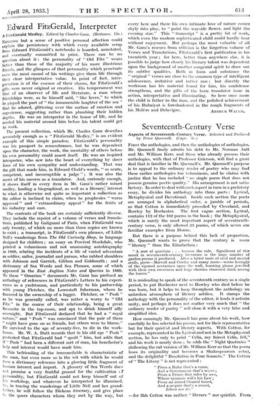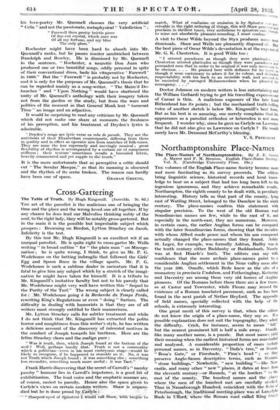Seventeenth-Century Verse
Aspects of Seventeenth-Century Verse. Selected and Prefaced by Peter Quennell. (Cape. 6s.) FIRST the anthologies, and then the anthologies of anthologies. Mr. Quennell freely admits his debt to Mr. Norman Ault and Mr. William Kerr, and those who already possess their
anthologies, with that of Professor Grierson, will find a great deal that is familiar in Mr. Quennell's. Mr. Quennell's purpose is to appeal to the ordinary reader of poetry who may find these earlier anthologies too voluminous, and he claims with justice that he has included " no single poem that does not possess genuine poetic quality." His arrangement is not satis- factory. In order to deal with each aspect in turn in a prefatory essay, he divides his anthology into three parts : Lyrical, Metaphysical and Devotional. Inside each section the poets are arranged in alphabetical order, a jumble of periods, so that Cotton is immediately preceded by Cleveland, and Rowley by Rochester. The first vague section, Lyrical, contains 112 of the 162 poems in the book ; the Metaphysical, which is surely the most important aspect of seventeenth- century verse, is only allowed 23 poems, of which seven are familiar examples from Donne.
But there is a purpose behind this lack of proportion. Mr. Quennell wants to prove that the century is more " literary " than the Elizabethan :
" A sort of quietism . . . became the rule. Significant of this mood in seventeenth-century literature is the largo number of garden-poems it produced. After a bitter taste of civil and mental strife, poets—Marvell and Cowley and many more—wrote lovingly of the ripened nectarines upon tho wall, bursting plums jewelled with their own sweetness and huge cherries clustered thick among the leaves."
It is misleading to speak of the seventeenth century as a single period, to put Rochester next to Rowley who died before he was born, but it helps to keep throughout the anthology an unbroken atmosphere of literary artifice. It stamps the
anthology with the personality of the editor, it lends it artistic unity, and perhaps it does not matter very much that " the ordinary reader of poetry " will close it with a very false and simplified idea.
How cunningly Mr. Quennell has gone about his work, how carefully he 'has selected his poems, not for their representative but for their quietist and literary aspects. With Cotton, for example, represented in the Lyrical and not in the Metaphysical section, he has only to print " Celia, my fairest Celia, fell," and his work is nearly done ; he adds the " Night Quatrains " (following the cut version of Mr. William Kerr so that the poern loses its originality and becomes a Shakespearean echo), and the delightful " Resolution in Four Sonnets." The Cotton of " The Litany " is not represented :
" From a Ruler that's a curse, And a Government that's worse ; From a Prince that rules by awe, Whose tyrannic will's his Law ; From an armed Council board, And a sceptre that's a sword, Libera nos f 7e."
—for this Cotton was neither " literary " nor quietist. From his love-poetry Mr. Quennell chooses the very artificial " Celia " and not the passionate, metaphysical " Valediction r -" Farewell thou pretty brittle piece Of fine-cut Crystal, which once was Of all my fortune, and my bliss The only glass." • Rochester might have been to absorb into Mr. . . .
Quennell's ranks, but he passes muster sandwiched between -Randolph and Rowley, He is dismissed Quennell . by Mr. Quennel in the sentence, " Rochester, a neurotic Don Juan who produced one or two beautiful songs;'oddly personal in spite of their conventional dress, bade his vituperative Farewell' in 1680:' But the " Farewell " is probably not by Rochester, • and it is only for the purposes of Mr. Quennelrs thesis that he can be regarded mainly as-a song-writer. " The Maim'd De- ..bauchee " and " Upon Nothing " would have shattered the unity of Mr. Quennelrs anthology with their imagery taken not from the garden or the study, but from the wars and politics of the moment so that General Monk lent " turncoat
Time an image and an adjective. -
It would be surprising to read any criticism by Mr. Quennell which did not make one share at moments the freshness of his perception, and his treatment, of Dryden's lyrics is admirable.
Dryden's songs are lyric verse en robe de parade. They are the antithesis of their Elizabethan counterparts, differing from them in quality and in effect as Operatic airs from snatches of folk-tunes. - They are none -the less supremely and Movingly musical ; great flexibility of rhythm is accoinfanied by-ascertain air of sumptuous stillness ; their texture' sometimes recalls a brocaded fabric, heavily ornamented and yet 'supple to the touch."
..It is the more unfortunate that so perceptive a critic should cut " The Secular Masque," so that its meaning is obscured and the rhythm of its scene broken. The reason can hardly have been one of space.
GRAHAM GREENE.







































 Previous page
Previous page